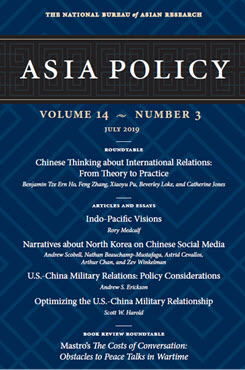Netizen Opinion and China's Foreign Policy
Interpreting Narratives about North Korea on Chinese Social Media
This article analyzes Chinese netizen opinion of North Korea by examining thousands of Chinese-language social media posts.
Executive Summary
MAIN ARGUMENT
The impact of netizen opinion on one of China’s most challenging contemporary foreign policy issues is difficult to assess. Previous research on Chinese attitudes toward North Korea has focused on elite policy debates and paid little attention to popular views. To address this imbalance, this article collects a novel dataset of thousands of Chinese-language social media posts on the leading microblog, Sina Weibo (Xinlang Weibo), in 2015. Analysis of this dataset reveals four multilayered popular Chinese narratives on North Korea: one ridiculing the country and its youthful leader Kim Jong-un, a second critiquing China via unflattering comparisons and parallels with North Korea, a third assessing China and the legacy of the Korean War, and a fourth addressing the ongoing foreign policy security challenge that North Korea poses to China. These popular narratives are in direct conflict with China’s official narrative of long-standing, battle-tested comradely relations between the two states. This official narrative also pointedly omits any detailed characterization of North Korea and its leaders and only refers to denuclearization in the context of the entire peninsula. Moreover, the popular narratives mirror elite discourse while providing greater nuance and context for understanding Beijing’s tormented relationship with Pyongyang. These findings underscore the complexities and underlying sensitivities of China’s disposition vis-à-vis North Korea.
POLICY IMPLICATIONS
- Netizen narratives on North Korea reveal a lively popular discourse that tends to mirror elite discourse and conflicts with China’s official narrative.
- While the specific impact of online public opinion on Chinese foreign policy is difficult to assess, China’s state monitoring and censorship decisions suggest that it is of irrefutable interest and relevance to policymakers.
- Cognizant that many netizens hold strong negative views of North Korea, China may be playing a two-level game with such sentiment, seeking to mollify Chinese public frustration with both countries’ leaders, while at the same time signaling to Pyongyang that Beijing’s policy is under substantial pressure from Chinese netizens.
Andrew Scobell is a Senior Political Scientist at the RAND Corporation and an Adjunct Professor in the Edmund A. Walsh School of Foreign Service at Georgetown University.
Nathan Beauchamp-Mustafaga is a Policy Analyst at the RAND Corporation.
Astrid Cevallos is an Adjunct Policy Analyst at the RAND Corporation.
Arthur Chan is a Research Associate at the Institute for Defense Analyses. He was previously a Policy Analyst at the RAND Corporation.
Zev Winkelman is a Senior Information Scientist at the RAND Corporation.
About Asia Policy
Asia Policy is a peer-reviewed scholarly journal presenting policy-relevant academic research on the Asia-Pacific that draws clear and concise conclusions useful to today’s policymakers. Asia Policy is published quarterly in January, April, July, and October and accepts submissions on a rolling basis. Learn more


